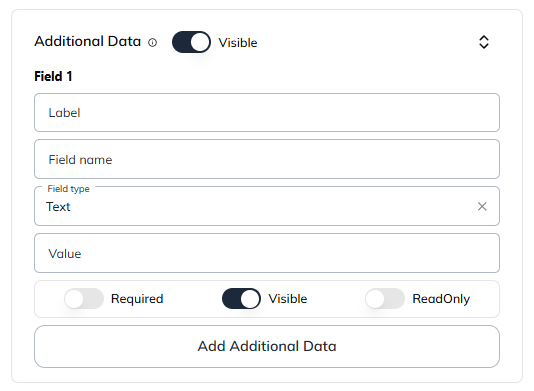Add additional data to boarding applications
Learn how additionalData works in boarding applications
The additionalData object is a flexible extension point in Payabli’s boarding APIs that allows you to pass custom key-value pairs associated with the application, business, owners, or signers. This flexibility is useful for enriching the application context or aligning with your existing systems.
To use additionalData fields, your boarding templates must be updated to include additionalData. Contact your Payabli solutions engineer to update your boarding templates.
Common use cases
Here are some common scenarios where additionalData is useful:
- Add business-level
additionalDatato indicate how long you’ve worked with the merchant. Payabli uses this data to inform custom underwriting policies. - Include a unique user ID in the owner’s
additionalDatato streamline post-boarding user provisioning in their portal. - Supply historical risk scores and account balance information in
additionalDatato inform your own underwriting decisions while leveraging Payabli for orchestration.
Don’t transmit sensitive data like credit scores, Social Security Numbers, or birthdates in additionalData. These fields aren’t intended for storing Personally Identifiable Information (PII) or regulated data.
Best practices
Keep these best practices in mind when using additionalData with boarding operations:
- Avoid transmitting unstructured or nested data. Stick to flat key-value pairs.
- Keep keys predictable and consistent across environments and integrations.
- Don’t use
additionalDataas a substitute for core schema fields like legal name or Social Security Number. - If a field is critical for compliance or reconciliation, consider formalizing it in your integration rather than relying on
additionalData.
Where additionalData is available
You can add the additionalData object to three main objects in the boarding template to be captured on boarding applications:
- Root business level: Fields that apply to the business entity
- Owners: Fields associated with each beneficial owner
- Signers: Fields associated with individuals signing on behalf of the business
This allows precise scoping of data depending on the entity to which it pertains.
Adding additionalData to templates
To update your templates to include additionalData, contact your Payabli solutions engineer.
Boarding templates are essential for defining how services, pricing, and dynamic fields (including additionalData) are presented during boarding. To make sure that your additionalData fields are rendered in boarding applications, you must first declare them in your boarding templates.

How an additionalData field appears in the template editor
The next section describes the configuration options available for each additionalData field in your boarding templates.
Field configuration options
Each additionalData object on a boarding template has these parameters:
Field types
These settings let you customize boarding flows based on operational or compliance requirements while creating a user-friendly experience.
Passing additionalData on applications
When using the POST /Boarding/app endpoint, you can pre-populate additionalData to streamline the user experience and enrich the application context.
Here is an example of how to pass additionalData at the business level:
This data is visible in the Payabli dashboard under the “Additional Data” section of the application or paypoint’s record, and you can also retrieve it via the API by calling any of the GET boarding app endpoints, such as GET /Boarding/read/:appId.
Related resources
See these related resources to help you get the most out of Payabli.
References
- Boarding statuses reference - Learn about statuses and substatuses during the merchant boarding process
- Paypoint statuses - Learn about the different statuses of paypoints